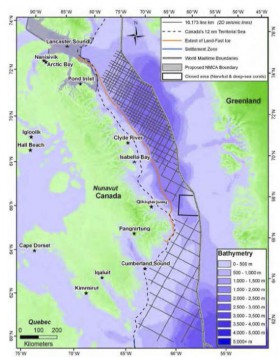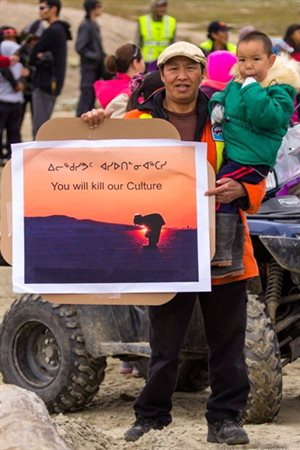The proposal from a consortium of three international companies to conduct seismic exploration off Baffin Island was first put forth in 2011. The companies are TGS-NOPEC, Petroleum Geo-Services and Multi Klient Invest.
An air gun is used to create loud sonic booms which travel through the water into the ocean floor and reflect off different layers beneath. Analysis of variations in those reflections provide indication of the presence of oil or gas pockets beneath the ocean floor.

A five-year 2D seismic testing plan for oil and gas has been approved in the cross-hatched area of Baffin Bay and Davis Strait.in an area outside the 12 nautical mile boundary (National Energy Board) CLICK to enlarge
Inuit on the island say consultations with them have been inadequate and their concerns about effects on marine life have not been listened to. They say Baffin Bay and Davis Strait are fragile and ecologically diverse with many whales, walrus, and seals, and there isn’t any solid information about how seismic testing would affect them and their environment.
RCI- Lancaster Sound protection
The hamlet of Clyde River is leading the opposition to testing and has wide support throughout Nunavut.
In 2013, Clyde River Councillor (now Mayor) Jerry Natanine said, “They don’t have any information how halibut, turbot or shrimp or any micro-organisms would be affected, and any negative effects on those would have a negative effect on the seals which is our mainstay in this community.”
The National Energy Board approved the testing in 2014 saying it would begin in 2015 when the ice cleared.
In a statement of support for the Inuit, Amnesty International said the issue goes beyond economics and into the area of human rights. On it’s website it wrote that the Hamlet of Clyde River and the Nammautaq Hunters and Trappers Organization allege that the NEB failed to adequately consider the harmful effects of seismic testing on marine mammals and on Inuit food, economy and culture, and that the decision violated the constitutional rights of the Inuit.

Alex Neve, Secretary General of Amnesty International Canada says,“Canadian and international law both require rigorous precautions to ensure that resource development decisions don’t lead to further marginalization and dispossession of Indigenous peoples”
He adds, “The Supreme Court of Canada has been clear that decision-makers should aim to comply with Canada’s international human rights obligations when interpreting Canadian law, (…) With oil and gas development at the heart of the federal growth strategy, the Clyde River case provides an important opportunity to ensure that decisions about which projects go ahead, and which are rejected, comply the global human rights protections that Canada has endorsed.”
Appeals Court to hear case April 20
Clyde River and the Hunters and Trappers have launched a judicial review of the NEB decision and the case has now gone to the Federal Appeals Court.
Amnesty had applied for intervenor status but a multi-page response to the Amnesty request by the consortium said that allowing Amnesty into the process would cause undue delay.
It wrote in part, “It would result in the need for complex and detailed research and submissions, additional evidence and likely delay in the current hearing schedule.”
The court denied the Amnesty request.
The court will begin its review starting April 20, when the panel of three judges will hear both sides and decide to uphold or deny the NEB decision to allow the five-year testing.
A rally of support for the Inuit case is planned outside the court buildings in Toronto. Lawyers for Clyde River say that if the court does not reach a verdict before the ice melts, an injunction may be sought to delay the seismic blasts until the decision is reached.
In 2010, a Nunavut court issued an injunction to stop seismic testing in Lancaster Sound, a proposed Arctic national marine park. The injunction forced the German research vessel involved to change its route mid-cruise.







For reasons beyond our control, and for an undetermined period of time, our comment section is now closed. However, our social networks remain open to your contributions.